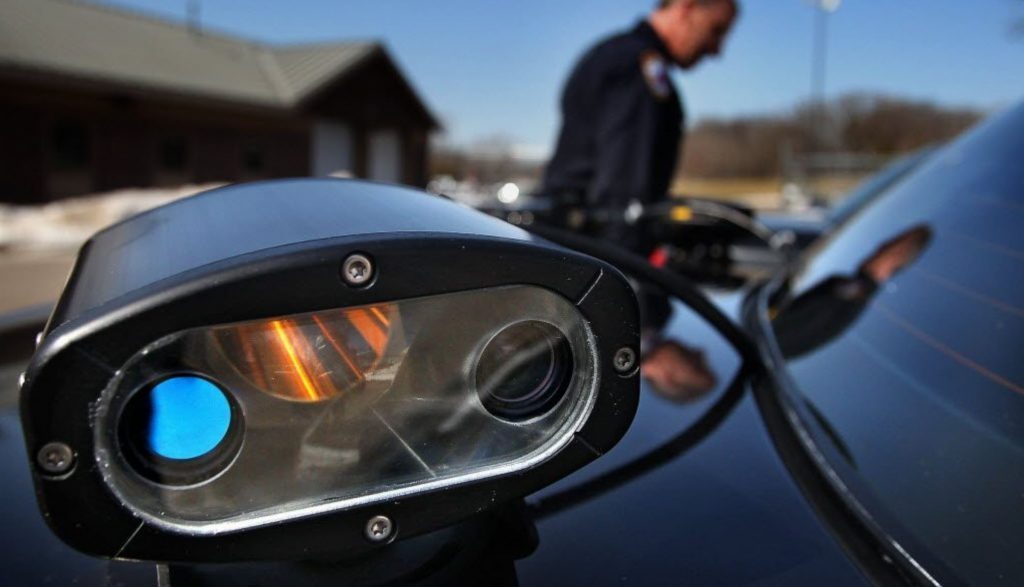Yesterday, Nebraska Gov. Pete Ricketts signed a bill into law that puts limitations on the storage and sharing of information collected by Automated License Plate Readers (ALPRs) by law enforcement in the state, and places significant roadblocks in the way of a federal program using states to help track the location of millions of everyday people through pictures of their license plates.
Sen. Matt Hansen (D-Dist. 26) sponsored LB93. The new law restricts the use of ALPRs to specific law enforcement functions and places strict limits on the storage and sharing of any data collected by such systems.
On Feb. 8, the Nebraska unicameral legislature passed LB93 by a 47-0 margin. With Ricketts’ signature, the law will go into effect three months after the end of the current legislative session.
LB93 prohibits the use of ALPRs except for specified law enforcement activities, including locating missing persons, persons with outstanding traffic or parking violations, vehicles in violation of registration requirements and persons subject to arrest warrants. It also allows the use of ALPRs to regulate the use of a parking facility. The law bans bulk collection of license plate data using ALPRs in the state.
The new law’s strength lies in its strict limits on data retention and sharing. The legislation generally prohibits storage or sharing of ALPR data. Government agencies are prohibited from retaining data for more than 120 days without a warrant, a court issued preservation order or if the information is evidence related to certain authorized purposes (actual criminal investigations).
Illegally gathered or retained data is inadmissible in court and other proceedings.
Captured plate data and no evidence derived therefrom may be received in evidence in any trial, hearing, or other proceeding before any court, grand jury, department, officer, agency, regulatory body, legislative committee, or other authority of this state, or a political subdivision thereof, if the disclosure of that information would be in violation of the Automatic License Plate Reader Privacy Act.
The bill also stipulates that any data entered manually into the system by an officer must be purged at the end of his shift.
Finally, the law requires law enforcement agencies using ALPRs to develop a publicly available detailed plan governing their use, including a privacy policy to ensure that captured plate data is not shared in violation of the Automatic License Plate Reader Privacy Act, and imposes strict reporting requirements for any agency using ALPRs.
The new law will prevent the state from creating permanent databases using information collected by ALPRs, and makes it less likely that such data will end up in federal databases.
IMPACT ON FEDERAL PROGRAMS
The ACLU estimates that less than 0.2 percent of plate scans are linked to criminal activity or vehicle registration issues.
As reported in the Wall Street Journal, the federal government, via the Drug Enforcement Agency (DEA) tracks the location of millions of vehicles. They’ve engaged in this for nearly a decade, all without a warrant, or even public notice of the policy.
State and local law enforcement agencies operate most of these tracking systems, often paid for by federal grant money. The DEA then taps into the local database to track the whereabouts of millions of people – for the simple act of driving – without having to operate a huge network itself.
Since a majority of federal license plate tracking data comes from state and local law enforcement, passage of this legislation would take a major step toward blocking that program from continuing in Nebraska. The feds can’t access data that doesn’t exist.
“No data means no federal license plate tracking program,” Tenth Amendment Center founder and executive director Michael Boldin said.
Law enforcement generally configures ALPRs to store the photograph, the license plate number, and the date, time, and location of vehicles. But according to newly disclosed records obtained by the ACLU via a Freedom of Information Act request, the DEA also captures photographs of drivers and their passengers.
According to the ACLU:
One internal 2009 DEA communication stated clearly that the license plate program can provide “the requester” with images that “may include vehicle license plate numbers (front and/or rear), photos of visible vehicle occupants [redacted] and a front and rear overall view of the vehicle.” Clearly showing that occupant photos are not an occasional, accidental byproduct of the technology, but one that is intentionally being cultivated, a 2011 email states that the DEA’s system has the ability to store “up to 10 photos per vehicle transaction including 4 occupant photos.
With the FBI rolling out facial a nationwide recognition program, and the federal government building biometric databases, the fact that the feds can potentially access stored photographs of drivers and passengers, along with detailed location data, magnifies the privacy concerns surrounding ALPRs.
Passage of this legislation represents a good first step toward putting a big dent in federal plans to continue location tracking and expanding its facial recognition program. The less data the state makes available to the federal government, the less ability they have to track people in Nebraska, and elsewhere.
Michael Maharrey [send him email] is the Communications Director for the Tenth Amendment Center, where this article first appeared. He proudly resides in the original home of the Principles of ’98 – Kentucky. See his blog archive here and his article archive here. He is the author of the book, Our Last Hope: Rediscovering the Lost Path to Liberty. You can visit his personal website at MichaelMaharrey.com and like him on Facebook HERE


One down, 49 to go! We also need to make certain that the infamous “administrative subpoenas” are not passed off as warrants signed by a real court (NOT FISA). The collection of biometric data (facial recognition) is particularly worrisome because it has been proven to be less than 50% accurate. The false “hit” rate is close to 60%.